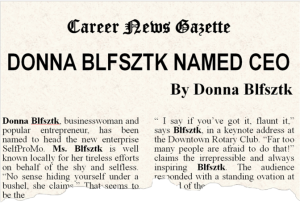Three common profile mistakes
 Your career profile on LinkedIn, your website, or your Facebook business page needs to give a quick overview of your skills and accomplishments. Busy people have short attention spans.
Your career profile on LinkedIn, your website, or your Facebook business page needs to give a quick overview of your skills and accomplishments. Busy people have short attention spans.
So if you’re trying to attract clients, investors, or potential employers, the profile is your 15-second opportunity to grab their attention.
Most of all, you want to avoid anything that makes the reader stop reading.
We’ll start by assuming you know that vague, overblown claims are useless. Phrases such as “various worldwide leadership roles” and “global impact on society” tell the reader nothing about what you can do or what you have done. Buzzwords and clichés sound like exactly what they are – filler. If your profile is loaded with these, rewrite it using more concrete evidence of your achievements.
Your profile sums up your potential value to readers. It’s all right to paint an honest, positive picture of yourself. Go ahead and tell your story, taking whatever credit you deserve for all you’ve done. But if you claim too much credit, remember that whoever really did the work might be reading it.
Make sure the facts you cite are related to what you actually contributed. It’s not impressive to claim, “I swept floors at a company headquarters building valued at $70 million.” If you designed, built, or decorated it, that’s another matter.
Once your profile is tight, specific, and compelling, check for these common errors:
Principle-principal
Are you a founder or major figure in a company? Then you’re a principal, not a principle. If your title is something like Principal Member of Technical Team, spell it right. Nothing erodes confidence faster than misspelling your own title. Would you trust someone who claimed to have a Doctor of Filosofy degree?
Lead-led
Describe your past experience in the past tense. Say you sold, managed, developed, supervised, delivered, or led (not lead) something. The past tense of lead is led. Lead – pronounced “leed” – is present tense and it means you’re still doing that job. Lead – pronounced “led” – is a soft, malleable metal.
Writing in third person
Your profile is about you and everyone knows you wrote it. It’s no secret, and no one expects it to read like a newspaper article written by someone else. People who write in third person seem to think it gives them license to brag about themselves without seeming immodest. In fact, it has the opposite effect. It seems disingenuous and awkward. If your experience and skills are strong, the facts speak for themselves without hype or pretense. Save third person for recommendations, when you are writing about someone else.
Cautionary tale: Years ago, a member of my university newspaper staff wrote a shamelessly self-serving article about herself. Her name was in the headline and in nearly every sentence of the article. She intended it to run with no byline, as if it were a genuine news piece. But the editor was so tired of her relentless self-promotion that he sent it to press with her name under the headline, credited as the writer. The next day, 20,000 students enjoyed a great front-page laugh with their morning coffee – at her expense.
Oops.
Like TextCPR on Facebook!



